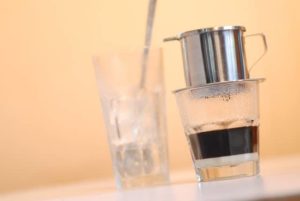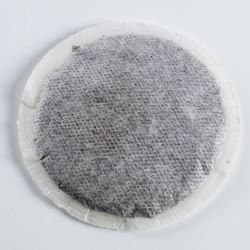Do Paper Filters Make Better Coffee & What Size Do You Need?
As many of our readers will know there are many brewing methods for coffee. Filter coffee however does remain a favourite brewing method in the UK. To make this type of "filter coffee," many home owners will use a filter coffee machine.
These filter machines are of course affordable and they do make great tasting coffee. You can also make this type of filtered coffee in a glass cafetiere. That is also sometimes referred to as the plunger method or French Press, and still an option in many UK hotels, though it has dwindled in popularity.
Those are the two best known methods of making filtered coffee.
The principle behind this filtered brewing method is pretty simple. You can grind your own fresh coffee beans to a medium grind. You can also buy commercially ground coffee beans with a medium grind.
The ground beans are put into your filter machine, and then the grinds are infused with hot water. Likewise the beans can be put into the cafetiere, and these are then plunged down into the hot water, and that process is simply known as infusion.
So what role does the paper filter play in this process?
Types of Coffee Filter
There are two main type of filters:
- Reusable or Permanent Filters
- Disposable or Paper Filters
Metal Filters
All cafetieres come with a reusable filter. Typically these are a round filter with small holes and are attached to the actual plunger. If you are using a filter machine, almost all of those come with what is called a permanent/reusable filter.
That type of filter is usually made of metal. These are easy to remove, and can then be washed out and cleaned before the machine is used the next time.
Nylon Filters
Some machines and cafetieres will come with a filter made of nylon. They serve the same purpose as a metal filter and are classed as permanent filter types. In older filter machines I have also see hard plastic filters that have a porous net made of plastic.
Advantages and Disadvantages of Using Reusable Filters
PROS
- Longevity They last for a very long time
- Stronger coffee roast -They allow more coffee through so slightly stronger coffee
CONS
- Cleaning They do need to be cleaned each time after use
- Sediment - even with the very best of these, there will always be a little sediment
Coffee Paper Filters Explained
Some filter coffee machines don't have these type of permanent filters as standard, and if you happen to own one of those, then you will need to use a paper filter.
Many coffee drinkers, even if their machine has a metal or nylon permanent filter, also choose to use a paper filter as well. I will go on to explain why they choose to do that later in this article.
Depending on the brand and model of your filter coffee machine, these filter papers come in different sizes. In addition to that they are also made from different materials which again I will explain in more detail.
What Are Paper Filters Made From?
The most important thing to note is that all paper filters are disposable. They are used once, and after they have done their job, then they have to be disposed off. You can not use a paper filter more than once as they become ineffective once they have been soaked.
Almost all filter papers are made from soft wood turned into paper. You can buy these as smooth filters and some will have crepe sides that are designed to make the coffee flow better into the filter.
Paper Filter Sizes
This is the area that causes most concern for buyers, so hopefully I can help clarify this for you.
In the UK, these paper coffee filters come in sizes 1, 2, 4 & 6. Please don't ask me what happened to sizes 3 & 5 because I don't honestly know.
Size 1 is the smallest with Size 6 being the largest. You almost always have to check the manufacturer handbook to find out what size of filter they recommend.
Let's Get a Little Technical (Coffee filter pore size)
Now to get a little more technical, and apologies if I bore you in this section, you need to understand just a little about two elements when it comes to buying paper filters.
- Micron
- Porosity

No I haven't turned into a scientist, but I did do my research. Porosity refers to the pores in the coffee paper and the key to this definition is that the paper holds back the small grains but allows the coffee to flow through the paper.
The micron measurement refers to the actual size of the pore. A typical good quality filter paper for coffee will have a size of 20 microns.
The good news for us coffee drinkers is that if we can remember that one number (20 microns) then you will know you are buying good quality filters that help make grain free coffee.
Advantages and Disadvantages of Using Paper Filters
PROS
- No Cleaning - they are thrown away after use
- Less Oil - Removes cholesterol raising oils
- Biodegradable : Can be composted and recycled
CONS
- Flimsy They can tear if low quality and that is frustrating
Why Use a Coffee Filter Paper?
The simple reason why people use a coffee filter paper is to filter out any remnants of your coffee grounds from your filtered coffee brew. If you have ever drunk a cup of filter coffee and ended up with a mouthful of grains when taking your last sup, then you will know why many people start using a paper filter.
It is happened to me more times than enough and it is the main reason I will always use a paper filter, when drinking this type of a filter brew.
Filter paper is permeable and it is that property that allows the steeped coffee to slowly filter into your cup or mug. In other words the paper filter acts as a barrier between the grounds and your cup and leaves your coffee free of grains.
Where to Buy Paper Filters and How Much Do They Cost?



It used to be really easy to find these in department stores and you still can in certain stores. However trying to find the exact size and brand can be a lot more difficult.
That explains why many people now just go online and search for them at websites like Amazon.
They are usually sold in boxes of 100 and on average cost around £3-4 for a box of 100 filters. The average cost per filter is 3-4 pence.
Are Reusable Coffee Filters Good?
When referring to reusable filters, this usually means the metal or nylon filter that comes with the machine. Personally speaking I believe that these do an adequate job, but depending the quality of your machine, some do a better job than others.
If you want to fully eliminate the risk of getting coffee grains in your drink, then always use the permanent filter and a paper filter to be completely safe.
A lot of the grains at the bottom of a cup does come down to the actual coffee grounds. Many people tend to blame the filters, but more often than not, the grinds are the real problem. Allow me to explain that as I believe it is very important point, that id often over looked.
Grinding for Filter Coffee Brews
For the perfect filter coffee the coffee beans should be ground to what is classed a medium grind. You do not want the grind to be too coarse or the coffee will be very weak as the water passes through the beans too quickly.
On the other hand you never want a fine grind as this is the cause of the grains at the bottom of your cup. A fine grind is perfect for an espresso style machine as those grinds are treated with pressurised water from your coffee machine.
So medium grind is perfect for filter coffee.
What tends to happen though is that when you grind beans, and the grind is not consistent, you will always get some larger pieces of bean and some very small pieces of bean which are pretty close to dust. It is that dust like part of the bean that ends up in the bottom of your cup.
To get a consistent grind size, you really do need a high quality burr grinder. Those can be more expensive than the more basic blade grinder, but they will do a more consistent job of grinding.
Even with bought coffee grains, there will still be some dust, so I would always recommend using a paper filter.
Substitutes for Filter Paper - Paper Towels Etc??
Many people do ask the question, "Is there an alternative to using a paper filter?" The simple answer is no there really isn't. The permanent filter does work OK in cafetieres and the one that comes fitted as standard in most coffee filter machines.
However, other paper substitutes like kitchen roll, paper towels or toilet roll does not work as a paper filter for coffee. Most of that type of paper will simply tear under the heat of the water. It actually makes a horrible mess as well.
Most paper towels are designed to absorb water and as such do not let water through them. They will leak when saturated with water, but the holes in paper towels are simply just far too small.
I mentioned the micron rating earlier and that is the main reason that paper substitutes simply do not work.
Are Paper Coffee Filters Safe?
Filter papers are both disposable and biodegradable which means that there is no harm done to the environment by using them. They also make cleaning your filter machine a great deal easier.
Filter paper absorbs oils in the coffee that are released by the grounds. These oils are known as "diterpenes." Too much of this oil is known to block a receptor in the intestines and that receptor helps regulate your cholesterol.
For me that is another big benefit of using a paper filter.
Do Filter Coffee Papers Make Better Coffee?
There are two opposing opinions on this. On one side you have people like me who want to drink grain free filter coffee. On the other side of the argument you have some coffee drinkers who say that paper filters remove some of the flavour and strength from the coffee.
Those people are right as the filter does remove a little of the strength and a little of the taste, but I have never been able to tell the difference. It is in my opinion so small of a difference that I can not detect it.
And if that were not enough, I would gladly give up a little taste to avoid a mouthful of grains.





Hi,i would like to know whether there’s a problem/danger in using disposable coffee filter papers after the expiry date written on the container?
I have never experienced any problems with using paper filters, even old ones, though a few friends did say they got a paper taste when they get so old that they start to curl. There are no ingredients in them that would cause damage, but they could impact on the coffee taste
Thanks for your article, I use both metal and paper filters depending on the brewing method but do tend to prefer the paper filters for the cleaner cup they produce
I will be using a paper filter in a metal permanent filter. Does this change the size of the grind – should it still be medium grind? Thank you.
Yes you should still use a medium grind